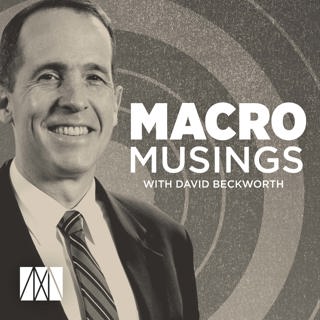
39 - Allan Meltzer on the Monetarist Counterrevolution and Economic Reforms
In this week's special episode recorded in front of a live audience, David interviews the renowned monetary economist, Allan Meltzer. Meltzer, a professor of political economy at Carnegie Mellon University and one of the founders of the monetarist school of thought discusses his long career in academia and policy. David and Allan also discuss current central bank policy, both in the United States and abroad, and how monetary policy can become more rules-based. Finally, Allan also argues many of our current economic problems are real, not nominal, and he hopes a Trump Administration can address some of these woes. Note: this episode took place before the December 2016 interest rate hike by the Federal Reserve. David's blog: http://macromarketmusings.blogspot.com/ Allan Meltzer's bio: http://tepper.cmu.edu/our-faculty-and-research/about-our-faculty/faculty-profiles/am05/meltzer-allan David's Twitter: @DavidBeckworth Related links: "A History of the Federal Reserve (Volumes I and II)" by Allan Meltzer (University of Chicago Press) http://www.press.uchicago.edu/ucp/books/book/chicago/H/bo3634061.html http://www.press.uchicago.edu/ucp/books/book/chicago/H/bo6887672.html "Keynes's Monetary Theory: A Different Interpretation" by Allan Meltzer (Cambridge University Press) https://www.amazon.com/Keyness-Monetary-Theory-Different-Interpretation/dp/0521022754
9 Jan 201753min

38 - Ylan Mui on the Fed Beat and Trumponomics
Ylan Mui covers White House economic policy for the Washington Post. Previously, she covered the Federal Reserve. Today, she joins the show to discuss what it is like to attend Fed press conferences and write on the technical nuances of Fed policy. David and Ylan also discuss what a Trump Administration might mean for economic issues ranging from trade to infrastructure spending to monetary policy. David's blog: http://macromarketmusings.blogspot.com/ Ylan's archive: https://www.washingtonpost.com/people/ylan-q-mui/ David's Twitter: @davidbeckworth Ylan's Twitter: @ylanmui
2 Jan 20171h

37 - Laura Birg and Anna Goeddeke on Christmas Economics
In this week's special episode, David discusses the economics of Christmas with Laura Birg, a post-doctoral researcher at the University of Goettingen, and Anna Goeddke, a professor of economics at the ESB Business School at Reutlingen University. Topics include the dead-weight loss of gift-giving, Christmas' effects on seasonal GDP, increases in alcohol consumption, and the effect of secularization on Christmas celebrations. [Note: We will be taking a break next week for the holidays, but we will be back the following Monday, January 2, with the Washington Post's Ylan Mui!] David's blog: macromarketmusings.blogspot.com/ David's Twitter: @davidbeckworth Anna's VoxEU profile: http://voxeu.org/users/annagoeddeke0 Anna's Twitter: @annagoeddeke Laura's University of Goettingen profile: https://www.uni-goettingen.de/en/362254.html Related links: "Christmas Economics – A Sleigh Ride" by Laura Birg and Anna Goeddke (2014) https://papers.ssrn.com/sol3/papers.cfm?abstract_id=2526055 "The Seasonal Cycle and the Business Cycle" by Robert Barsky and Jeffrey Miron (1988) http://www.nber.org/papers/w2688 "The Business Cycle Effects of Christmas" by YI Wen (2001) https://www.discuto.io/sites/default/files/christmas2010.pdf We Wish you a Merry Christmas Kevin MacLeod (incompetech.com) Licensed under Creative Commons: By Attribution 3.0 License http://creativecommons.org/licenses/by/3.0/
19 Des 201654min

36 - The Macroeconomics of Star Wars and Star Trek
In this week's special episode, David compares and contrasts the economics of the Star Wars and Star Trek universes. He is joined by Zachary Feinstein, an Assistant Professor at Washington University in St. Louis, and Manu Saadia, author of *Trekonomics.* Topics include the economic fallout from the destruction of the Death Star, the absence of money in Star Trek, and whether a universe can really eliminate scarcity. David's blog: http://macromarketmusings.blogspot.com/ David's Twitter: @davidbeckworth Manu's *Trekonomics* website: https://trekonomics.tumblr.com/ (you can order the book, *Trekonomics,* here as well) Manu's Twitter: @trekonomics Zach's faculty profile: https://sites.wustl.edu/fictionomics/ Zach's Twitter: @FictionomicsWU Related links: "It's a Trap: Emperor Palpatine's Poison Pill" by Zachary Feinstein https://arxiv.org/pdf/1511.09054.pdf "The Case for the Empire" by Jonathan Last http://www.weeklystandard.com/the-case-for-the-empire/article/2540
12 Des 201658min

35 - Peter Conti-Brown on *The Power and Independence of the Federal Reserve*
Peter Conti-Brown is an Assistant Professor at The Wharton School of the University of Pennsylvania. He joins the show to discuss his new book, *The Power and Independence of the Federal Reserve,* which exams the evolution of the Federal Reserve and what central bank independence really means. Peter also shares his thoughts on what a Trump presidency might mean for monetary policy. David's bio: http://macromarketmusings.blogspot.com/ Peter's UPenn bio: https://lgst.wharton.upenn.edu/profile/30645/ David's Twitter: @davidbeckworth Peter's Twitter: @PeterContiBrown Related links: *The Power and Independence of the Federal Reserve* by Peter Conti-Brown https://www.amazon.com/Power-Independence-Federal-Reserve/dp/0691164002 *America's Bank: The Epic Struggle to Create the Federal Reserve* by Roger Lowenstein https://www.amazon.com/Americas-Bank-Struggle-Federal-Reserve/dp/1594205493
5 Des 20161h 7min

34 – JP Koning on Goldbugs, African Monetary History, and Fedcoin
JP Koning is an economic consultant and writer. He joins the show to discuss fascinating stories in monetary history in Libya, Zimbabwe, and Switzerland. He also shares his thoughts on Blockchain technology and Fedcoin, a hypothetical cryptocurrency stabilized by the Federal Reserve. David's blog: http://macromarketmusings.blogspot.com/ JP's blog "Moneyness": http://jpkoning.blogspot.com/ David's Twitter: @davidbeckworth JP's Twitter: @JP_Koning Related links: "What Happens When a Central Bank Splits in Two?" by JP Koning http://jpkoning.blogspot.com/2016/06/what-happens-when-central-bank-is-split.html "A Modern Example of Gresham's Law" by JP Koning http://jpkoning.blogspot.com/2016/11/a-modern-example-of-greshams-law.html "Fedcoin" by JP Koning http://jpkoning.blogspot.ca/2014/10/fedcoin.html
28 Nov 201659min

33 - Mark Calabria on Housing Policy and the Behavioral Case for Monetary Rules
Mark Calabria is the director of Financial Regulation Studies at the Cato Institute. Before joining Cato in 2009, he worked as a member of the senior staff of the U.S. Senate Committee on Banking, Housing, and Urban Affairs. He joins the show to discuss working on Capitol Hill amidst the 2008 financial crisis. Mark also discusses his recent Cato paper where he argues insights from behavioral economics suggest monetary policy should be more rules-based. David's blog: macromarketmusings.blogspot.com/ Mark's Cato Institute profile: https://www.cato.org/people/mark-calabria Mark's Alt-M archive: http://www.alt-m.org/author/calabria/ David's Twitter: @davidbeckworth Mark's Twitter: @markcalabria Related links: "Yes, the Fed has a Diversity Problem" by Mark Calabria https://www.cato.org/blog/yes-federal-reserve-has-diversity-problem "Behavioral Economics and Fed Policymaking" by Mark Calabria https://object.cato.org/sites/cato.org/files/serials/files/cato-journal/2016/9/cj-v36n3-6.pdf
21 Nov 20161h 6min

32 - Roger Farmer on the Natural Rate of Unemployment Hypothesis and Prosperity for All
Roger Farmer is a Distinguished Professor of Economics at UCLA. He joins the show to discuss his new book, Prosperity for All: How to Prevent Financial Crises. He and David also discuss his criticism of the natural rate of unemployment hypothesis, an important proposition in mainstream macroeconomics. David's blog: http://macromarketmusings.blogspot.com/ Roger's personal website: http://www.rogerfarmer.com/ David's Twitter: @davidbeckworth Roger's Twitter: @farmerrf Related links: Roger's UCLA profile http://www.econ.ucla.edu/faculty/regular/Farmer.html Prosperity for All: How to Prevent Financial Crises by Roger Farmer https://global.oup.com/academic/product/prosperity-for-all-9780190621438?cc=us&lang=en& "The Natural Rate Hypthesis: An Idea Past Its Sell-by Date" by Roger Farmer http://www.nber.org/papers/w19267
14 Nov 201658min






















